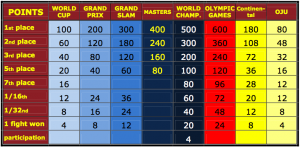This weekend (25 January 2009), the first of the events of the IJF ranking system will be held. The new system of ranking is important as it shall decide who can attend the London 2012 Olympic Judo tournament. In this post we shall take a good look at the system…

As you can see from the table, athletes are awarded ranking points depending on the position they reach and the event they are competing in.
So, win the World Championships and get 500 points, win one of the new masters events and get 400. Third in my native OJUs and you’ll get 32 points.
Come 30th April 2012, the players ranked in the top 22 for men, or top 14 for women (per category) are the qualifiers for the London Olympics.
The system gets more complicated from here on in, only the top 5 results per year are counted. So if you were to win the 2009 World Cup, Grand Prix, Grand Slam, Masters,World Championships and the OJUs; you would receive 1400 points. However, these points will not actually be worth 1400 in 2012, they will in fact only be worth 350 points as the points “degrade” by 25% per year (The dividing line is the beginning of the month in which the tournament ‘s first
competition day, was held).
Now the rest of the places in the games will be chosen by the Continental unions. Each continental union gets half the number of National Federations affiliated to each that union. So the EJU which has 50 member states and would receive 25 places for athletes who do not make the top 22/14. These will be decided basically by the top points scorer in the continent, until the fill quota is used, with a maximum of two athletes per category being qualified by this method.
Discussion
The new system starts with all athletes having zero points. So this weekend is the first opportunity for them to start qualifying for 2012.
It is however based on the result in the tournament not on the athletes you beat. If you happen to have the easiest draw in history at the World Championships it is worth just as much as if you fight all the top athletes in your category. Will this work well is to be decided, I have not seen what research was done in deciding on this system.
Personally, I am more in favour of a system like the ELO system used in Chess (and online gaming like Xbox Live). The ELO system takes into consideration the probabilities involved in one athlete beating another. If a player who is much lower on the ELO ranking beats a higher ranked player, they receive a larger number of ranking points than if they beat someone below them. It is my intention, if I can obtain all the draw sheets, to run the ELO system and monitor the rankings to see if it ranks athletes over the 4 years differently.
One thought on “The International Judo Federation (IJF) Ranking system.”